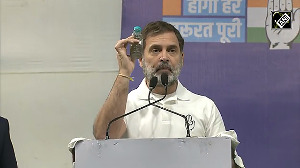India has voiced its strong opposition to China's Belt and Road Initiative and its flagship project -- the CPEC -- at the just concluded second UN Sustainable Transport Conference where the Indian diplomat's mike curiously went silent while she was highlighting New Delhi's objection to the controversial projects.

The sudden "mike failure" at the UN meet hosted by China in Beijing from October 14 to 16 created a flutter and took several minutes to restore.
Even the video of the next speaker began to play but it was halted by UN under-secretary-general Liu Zhenmin, the former vice foreign minister of China, who urged the Indian diplomat, Priyanka Sohoni, second secretary of the Indian embassy in Beijing, to continue her speech.
After the mike system was restored at the conference hall, Liu said, ”Dear participants, we are sorry. We are confronting some technical problems and played the video of the next speaker. I am sorry for that,” and asked Sohoni to resume her speech.
"You are lucky.. You are back and welcome back," he told Sohoni following which the Indian diplomat continued her speech without interruption.
"We share the international community's desire for enhancing physical connectivity and believe it should bring greater economic benefits to all in an equitable and balanced manner," Sohoni said.
"Expansion and strengthening of physical connectivity is an integral part of India's economic and diplomatic initiatives,” she said.
"There have been some references to the Belt and Road Initiative or BRI at this conference. Here, I wish to say that as far as China's BRI is concerned, we are uniquely affected by it. It's inclusion of the so-called China Pakistan Economic Corridor as a flagship project impinges on India's sovereignty,” Sohoni said.
The BRI is a multi-billion-dollar initiative launched by Chinese President Xi Jinping when he came to power in 2013. It aims to enhance China's influence and also link Southeast Asia, Central Asia, the Gulf region, Africa and Europe with a network of land and sea routes.
The USD 60 billion CPEC, which connects Gwadar Port in Pakistan's Balochistan with China's Xinjiang province, is the flagship project of the BRI.
India has been vocally objecting to China over the CPEC as it is being laid through the Pakistan Occupied Kashmir. Beijing for its part is playing down India's objections, saying it is an economic initiative and has not affected its principled stand on the Kashmir issue.
"No country can support an initiative that ignores its core concerns on sovereignty and territorial integrity," Sohoni said.
"This aside there are also larger issues regarding how connectivity initiatives should be pursued. We are of the firm belief that connectivity initiatives must be based on universally recognised international norms,” she said.
"They must follow principles of openness, transparency and financial responsibility and be pursued in a manner that respects sovereignty, equality and territorial integrity of nations. India for its part abides by these principles and stands ready to make collective efforts for sustainable development through a human-centric approach,” she said.
Sohoni also said that India has adopted bold measures in the realm of clean energy, energy efficiency, deforestation and biodiversity.
"We have ambitious renewable energy target of 450 GW by 2030 demonstrating our commitment towards combating climate change. It is not without a reason therefore we are among few countries whose NDC (Nationally Determined are two degrees compatible," she said.
"We are on track and exceed our commitments and targets from Paris. A drop of 24 per cent in emission intensity has already been achieved," she said.
Earlier, a few speakers ahead of Sohoni, a Pakistani diplomat had showered praise on the BRI and its flagship project CPEC, terming it as a ”game-changer” for the region.
Xi, who aggressively promoted BRI in the last few years, himself referred to it in his speech on the opening day of the UN conference on October 14 which focussed on promoting sustainable transport to bring down the carbon emissions.
"China will not change course in its pursuit of a new system of open economy of higher standards, and China will not waver in its resolve to promote trade and investment liberalisation and facilitation,” Xi said.
"China's door of opening-up will only open wider, and will never be closed. China will continue to advance high-quality Belt and Road cooperation, strengthen infrastructure connectivity with other countries, and develop a green Silk Road and a digital Silk Road at a faster pace,” he said.
After Sohoni's speech, Chinese transport minister Li Xiaopeng, who was present at the conference, responded to the Indian diplomat's criticism.
"I would like to extend my apologies for the technical glitch just now when the Indian delegate spoke," Li said.
"I don't want to be offensive. Just now you have mentioned a lot of topics. As for the topics you mentioned, I would like to make some complements,” Li said in an apparent reference to Sohoni's speech.
"The BRI is open and inclusive. We tried to improve the connectivity and seek the development of all countries. In the past eight years, all the international communities have welcomed this initiative. Up to now about 141 countries and 32 organisations have signed more than 200 agreements with China,” Li said.
"A lot of important and practical projects have been implemented, which includes a lot of important transport projects. I would like to invite all parties to contribute to the development of this (BRI) project," Li said.
Diplomatic sources said the Chinese minister's response at the conference to the Indian diplomat may constitute a breach of UN protocol.











 © 2025
© 2025